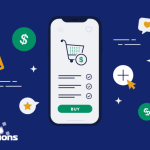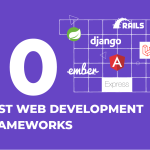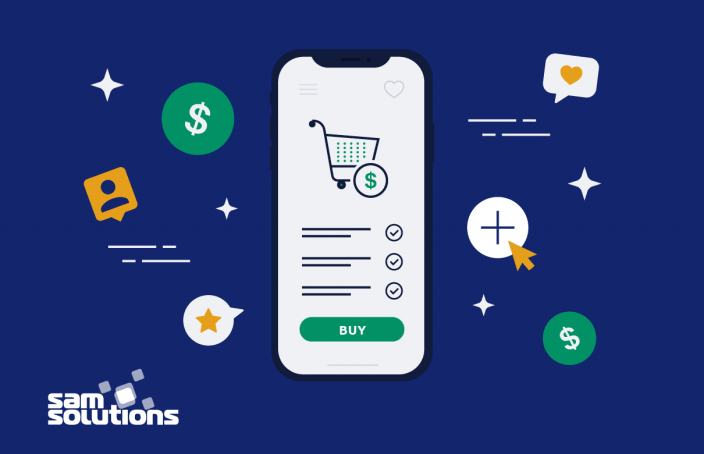Mobile application development has become a priority and the new normal for many businesses. Without mobile-optimized solutions, companies undoubtedly risk losing a significant number of clients and lagging behind the competition. In this article, we’ve compiled the key mobile app development trends shaping the industry in 2024.
Overview
The increased adoption of mobile devices has led to the remarkable growth of the mobile app industry. Here are some impressive statistics:
- In 2023, the number of smartphone users worldwide was estimated at 4.74 billion.
- As of January 2024, there are 3.553 million apps on Google Play and 1.642 million in the App Store.
- In 2023, users downloaded mobile applications 299 billion times, according to Statista. The most downloaded app categories are gaming apps and social media apps.
- 88% of mobile time is spent in applications, which is a significant increase from a few years ago.
Using these figures, it’s evident that mobile apps are creating exciting new business prospects. Why? Well, today’s consumers prioritize convenience, freedom, and speed when engaging with any business’s products or services. The applications installed on smartphones, tablets, and other portable devices serve as the optimal tools to guarantee the convenience, freedom, and speed that customers seek.But there is a catch: not all applications appeal to users and perform as intended. This happens when mobile app providers don’t consider customer needs and fail to follow the top trends when designing their solutions. And since customer needs vary for each project, knowledge in current trends in mobile development is essential. Let’s discuss them.
Enjoy the advantages of a mobile presence with SaM Solutions’ cross-platform mobile development services.
Latest Trends in Mobile Application Development
The article highlights the hottest mobile technology trends that will shape the industry in the near future: artificial intelligence (AI) and machine learning (ML), augmented reality and virtual reality, Internet of Things, 5G technology, cloud-based mobile app development, cross-platform mobile development, blockchain technology, voice user interfaces (VUIs), location feature, and on-demand apps. The following information can be valuable for both business leaders and those who develop software solutions for mobile devices. Take a look to discover something new or spark fresh ideas.
1. Artificial Intelligence (AI) and Machine Learning (ML)
Since 2017, the mobile industry has focused on artificial intelligence (AI), notably with Apple’s integration of the Siri voice assistant into applications. This pivotal development catalyzed the infusion of AI and machine learning algorithms into diverse application domains.
As we look ahead to 2024, the trajectory of mobile app trends is poised for a transformative shift towards AI-powered user experiences. Intelligent and context-aware applications are anticipated to:
- Recognize user emotions and adapt to them.
- Generate personalized content.
- Provide real-time analytics.
- Ensure online payment security.
In order to thrive in the face of intense competition, mobile app developers should stay at the forefront of this dynamic trend, embracing the upcoming wave of AI-driven advancements in user experiences and content generation.
2. Augmented Reality and Virtual Reality
An increasing number of apps are incorporating augmented reality (AR) and virtual reality (VR) features, and this trend shows no signs of fading. In 2023, the global mobile augmented reality (MAR) market was estimated at $4.2 billion. Foreseen to experience significant expansion, the MAR sector is set to grow at an impressive Compound Annual Growth Rate (CAGR) of 22.1%, resulting in a substantial market value of $31.5 billion by 2033.
A couple of years ago, AR and VR technologies were primarily utilized in gaming apps (remember the overwhelming success of Pokemon Go?) and marketing campaigns to entertain and impress customers. Today, the mobile world leverages augmented and virtual reality for more practical purposes, such as object measurement, navigation, interior design, user manuals, and more. AR/VR-powered apps provide incredible opportunities for virtually all industries, including retail, commerce, healthcare, education, tourism, manufacturing, automotive, sports, and others.
Furthermore, smartphone manufacturers have been increasing the production of AR-enabled devices. As a conservative estimate, in 2023, the number of devices allowing users to experience augmented reality reached 1.4 billion.
3. Internet of Things
The Internet of Things (IoT) has seamlessly integrated into various sectors, from healthcare and agriculture to manufacturing and transportation, leading to a surge in the development of mobile IoT apps. These apps empower users to monitor connected devices and sensors, access live video footage, analyze data, create charts, generate reports, manage devices, and perform other critical functions.
Thus, mobile applications serve as the central interface for human interaction with smart systems. For example, you can manage a smart coffee maker through an app and make coffee while comfortably lying on the sofa. Or, you can check what’s left in your smart refrigerator right from the store.
IoT-enabled applications have also revolutionized the way businesses operate. While a mobile app is just one component of the IoT infrastructure, its integration with technological advancements has the potential to boost productivity, streamline processes, and reshape both personal and business lifestyles.
For instance, companies leverage IoT apps with predictive analytics functionality:
- Gas pipeline networks, equipped with control sensors, benefit from engineers accessing real-time information and interacting with the system in the field via mobile applications.
- Railway companies, utilizing sensors on track sections to monitor rail load, employ mobile apps for real-time data analysis, receiving alerts, and addressing issues promptly.
IoT apps offer equal advantages for consumer-focused solutions like smart home appliances, wearables, and traffic sensors, as well as for enterprise-grade management in domains such as oil and gas networks, railway lines, and autonomous cars.
4. 5G Technology
5G is a game-changer in the world of mobile app development. The implementation of advanced technologies such as IoT, AI/ML, AR/VR, and cloud computing into mobile devices is possible due to the enhancement of wireless connectivity. Currently, the fifth-generation network is expanding globally, catering to the increased communication needs for billions of devices.
It provides four main benefits for mobile solutions:
- Speed – the 5G standard is up to 100x faster than 4G.
- Low latency – ultra-reliable low latency communication (URLLC) that comes with 5G ensures real-time data processing.
- Connectivity – with 5G, it is possible to connect up to a million mobile devices, compared to a couple of thousands supported by 4G. This opens up new opportunities for the development of IoT apps.
- Bandwidth – 5G offers excellent connectivity when working with low, mid, and high bands.
5. Cloud-Based Mobile App Development
Apps incorporating advanced technologies like artificial intelligence, machine learning, and IoT demand substantial storage within a mobile device’s internal memory. However, users generally prefer not to deal with gigabyte-sized apps.
Cloud computing easily solves this problem: remote servers offer the required storage space, allowing the app to function seamlessly. This way, users can quickly download apps without affecting their device’s internal memory. The advantages of leveraging the cloud include:
- secure operation across multiple devices
- cost savings on hosting
- enhanced computing power
- improved storage and loading capacity
- increased user retention
- streamlined operations
This is why more providers are actively investing in cloud-driven apps, contributing to the emergence of the cloud mobile era.
6. Cross-Platform Mobile Development
Android and iOS collectively dominate the mobile apps market, accounting for over 99%. Consequently, many businesses find it more cost-effective to develop a cross-platform app that seamlessly caters to all required platforms.
Cross-platform mobile development remains a persistent trend over the years. This strategy enables businesses to access a broader audience, minimize the time required for product creation, and optimize launch costs.
Practical experience demonstrates that foregoing cross-platform development results in a loss of approximately 23% of potential users when the application is exclusive to Android and a substantial 77% when developed solely for iOS.
7. Blockchain Technology
Blockchain emerges as one of the new trends in mobile app development, poised to become the cornerstone technology for ensuring robust mobile data protection.
In the contemporary business landscape, major entities such as stores, banks, and airline companies boast dedicated mobile applications. Given that users entrust these apps with sensitive information, robust security measures are imperative. Unfortunately, many apps exhibit vulnerabilities, providing openings for potential cyber threats.
Blockchain technology is utilized in mobile apps to enhance security, transparency, and decentralization.
- Secure data storage. Blockchain provides a decentralized and secure method for storing sensitive user data. Instead of relying on a central server, data is distributed across the network, reducing the risk of a single point of failure.
- Identity verification. Blockchain can be employed for secure identity verification, allowing users to control access to their personal information. This is particularly useful in applications requiring user authentication without compromising privacy.
- Smart contracts. Self-executing contracts with the terms of the agreement directly written into code are often implemented using blockchain technology. In mobile apps, smart contracts automate and enforce agreements, enhancing trust and reducing the need for intermediaries.
- Cryptocurrency transactions. Blockchain is fundamental to cryptocurrencies like Bitcoin and Ethereum. Mobile apps leverage the technology for secure and transparent peer-to-peer transactions, making payments more efficient and less prone to fraud.
8. Voice User Interfaces (VUIs)
Voice User Interfaces (VUIs) have emerged as a prominent trend in mobile app development, representing a significant stride towards an enhanced user experience. The integration of natural language processing and voice recognition technologies has transformed the dynamics of user interaction with applications, facilitating seamless input and retrieval of information through spoken language. Whether users are dictating messages, conducting web searches, or managing smart home devices, VUIs provide a more intuitive and accessible interface.
This trend not only elevates user engagement but also addresses accessibility needs, fostering greater inclusivity for a diverse audience within mobile apps.
Present-day VUIs and voice assistants adeptly handle routine tasks, such as retrieving information from the internet or adjusting phone settings. While their current capabilities are not overwhelmingly powerful, they are continuously evolving. In the foreseeable future, we anticipate the emergence of more robust programs driven by artificial intelligence. These advanced applications will be capable of tackling intricate problems, taking into consideration the political, economic, and social context of specific countries and the world at large. Developers are enthusiastic about creating voice assistants that can provide investment forecasts, recommend specialists, suggest evening activities, advise on educational institutions for children, and more.
At the pinnacle of their development, voice assistants are likely to possess the ability to discern the user’s mood and emotional state based on their speech. This enhanced capability will enable them to better understand user intentions and execute tasks with greater precision.
9. Location Feature
Modern businesses across various sectors aim to enhance customer engagement by understanding the geographic location from which users access their services. This demand leads to a continual integration of location-sharing features in service-oriented applications, unveiling new use cases for apps requiring geolocation mapping services.
Examples of app categories actively utilizing geolocation encompass:
- mapping and navigation tools
- weather-based apps
- social networking platforms
- dating services
- travel guides
- health and fitness trackers
- on-demand services, and more
10. On-Demand Apps
On-demand apps have rapidly ascended, altering the way users access services. These applications cater to the contemporary lifestyle, offering instant solutions at users’ fingertips. From ride-hailing and food delivery to grocery shopping and professional services, on-demand apps provide unparalleled convenience by connecting users with a myriad of services seamlessly.
This trend has not only transformed consumer expectations but has also created lucrative opportunities for businesses to thrive in the digital marketplace. With the increasing reliance on smartphones, on-demand apps have become an integral part of everyday life, exemplifying the dynamic nature of mobile app development in meeting the evolving needs of the modern user.
Connect with your users or clients on all platforms and devices using a custom mobile app created by SaM Solutions.
Why You Should Choose SaM Solutions as Your Mobile Development Partner
SaM Solutions has been present on the market for over three decades. Mobile app development is among the key services we offer to our clients.
Whether you seek consultancy, app modernization, or bespoke development from the ground up (be it for iOS, Android, Windows, or a cross-platform solution), we boast high-end services to meet your requirements. Regardless of the complexity of your concept, our team of seasoned mobile developers are enthusiastic about turning your ideas into reality. Armed with hands-on expertise in advanced technologies such as Xamarin and React Native, they prioritize the security and quality of the final product. Your expectations are carefully considered throughout the development process, ensuring a tailored solution that aligns seamlessly with your vision.
To Sum Up: Going Mobile Is the Right Way for Business
Current mobile trends prove that technologЫy continues to penetrate ever deeper into our lives. Applications that previously were just another touchpoint with the brand have come to the forefront.
Mobile development follows the latest innovations and offers powerful and convenient solutions. Companies focus on apps to attract loyal customers, while customers expect more services to be available via apps.
Soon, we’ll see an increasing number of smartphone solutions that will use multiple advanced technologies. Many companies will turn to apps as a complementary or even primary source of income.



























 5 Reasons Why Your Business Needs a Mobile eCommerce Application
5 Reasons Why Your Business Needs a Mobile eCommerce Application Using Salesforce to Improve Your Sales Pipeline: Five Tips
Using Salesforce to Improve Your Sales Pipeline: Five Tips Cross-Platform Mobile Development: Five Best Frameworks
Cross-Platform Mobile Development: Five Best Frameworks 10 Best Web Development Frameworks in 2023
10 Best Web Development Frameworks in 2023 How to Develop Custom Accounting Software
How to Develop Custom Accounting Software
![Digital Transformation Strategy [+ Key Trends in 2024]](https://www.sam-solutions.com/blog/wp-content/uploads/fly-images/21459/main-Digital-Transformation-Strategy-min-360x230.png)














